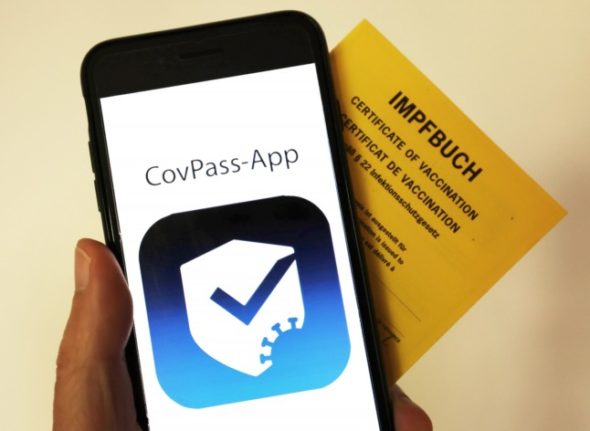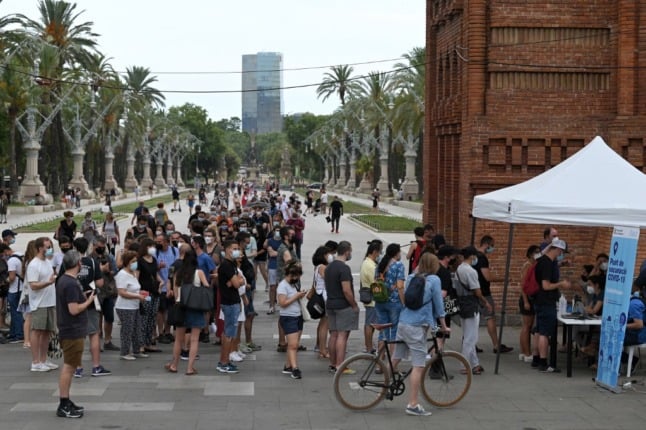What is Germany’s digital vaccination pass?
The digital vaccination record (der digitale Impfnachweis/Impfpass) is an additional option for documenting vaccinations that the German government is developing. Vaccinated people will be able to store information such as the date of their jab, and the type of vaccine they received, on their smartphones.
As well as a vaccination certificate, people will also be able to store their Covid test records to show if they have tested negatively for Covid or have recovered from an infection.
It is intended to make it easier to use for showing proof of immunity when visiting events, the hairdresser or during travel, for example. But it is not mandatory.
When is it happening?
The German Health Ministry said it would be rolled out “step by step” from Thursday June 10th.
Starting in July, people with Germany’s digital pass will also be able to use it for cross-border travel as part of the EU-wide ‘Covid health pass’ scheme.
READ ALSO: Germany’s digital vaccine to be rolled out ‘step by step’ from Thursday
How does the digital vaccination certificate work?
The digital vaccination certificate can be generated in a doctor’s practice or in a vaccination centre. After entering the data, a 2D barcode is printed out on paper.
To digitalise the vaccination certificate, the user can scan and upload it to their smartphone via an app, which will be available for download free of charge.
From next Monday people who have already been vaccinated can visit certain pharmacies with proof of their inoculation and request the digital certificate with the QR code.
READ ALSO: German pharmacies to start offering digital vaccine certificates from next week
What are the apps being used for it?
The German government has developed the ‘CovPass’ app which can then store the document and act as a health pass.
However, proof of being fully vaccinated can also be loaded on to Germany’s existing Corona Warning app, that was set up to warn people when they’ve come into contact with someone who has Covid-19.
Experts estimate that the Corona-Warn app is actively used by around 25 million people. People can already log their Covid test results onto the app.
READ ALSO: Germany’s coronavirus warning app to show ‘vaccine passport’ in future
People can choose either of these apps. The main difference is that the CovPass has no contact tracking function.
How will I be able to show proof of vaccination?
The vaccination certificate contains a QR code which can be scanned in order to prove the identity of the user. It can be used via the apps either digitally – or alternatively as a printout which can also be read through a scanner.
The certificate only contains information on the vaccination status, the name of the person and date of birth.
For service providers who want to check the vaccination status, there will be an option to scan the certificate (either the paper certificate or from the app) in a similar way to a barcode on an airline or train ticket. Alternatively, proof is possible with the paper vaccination booklet.
Germany recently started a pilot project trying out the new digital pass.
Okay, so why is this happening now?
At the beginning of the year, the European Commission agreed that countries would launch a digital health record – now called the EU Digital Covid Certificate.
The EU hopes the certificates, which they insist are not strictly “vaccine passports”, will make travel easier and safer, and boost the economies of tourism-dependent nations.
Member states, including Germany, have been implementing their own systems for how residents can upload their vaccine certificate or Covid-19 health status onto a digital platform.
At the same time the European Commission is putting together a plan to regulate an EU-wide recognition framework for vaccine certificates.
The EU says the certificates will be “free of charge, obtained easily and also available to people vaccinated before the EU Digital Covid Certificate Regulation has entered into force”.
READ ALSO: What’s the latest on how the EU ‘Covid passports’ will work for travellers?
Will the yellow analogue vaccination certificate still be available?
Yes. The digital vaccination certificate is only a “voluntary and complementary offer”, the German government says. If a vaccinated person does not have a digital version, the vaccination certificate in the internationally recognised “yellow booklet” is still possible and valid.
People without the yellow booklet can also be given a stamped piece of paper with details of their vaccine on it in Germany.
READ ALSO: ‘The only way forward’: Should Germany introduce a Covid-19 immunity passport?
Who can get an electronic vaccination certificate?
Anyone who gets inoculated in Germany should be able to get a digital vaccination certificate issued in addition to the paper vaccination certificate.
What about people who have already been vaccinated? Will they also receive a digital vaccination certificate?
Almost 19 million people are now fully vaccinated in Germany.
Various possibilities are being looked at to issue digital vaccination certificates at a later date. In principle, the certificate should be issued at the place where the person was vaccinated, said the government.
If the vaccination centres have the corresponding contact data, the QR codes could be sent automatically to people by post. As mentioned above, doctors and pharmacies should be able to issue vaccination certificates retrospectively.
How will forgery be prevented?
Special care must be taken when checking paper vaccination cards, said the government. This applies both when the card is used to enter shops or restaurants, for example.
And it also applies when the information is transferred from the paper to a digital vaccination card. Falsification of vaccination cards is punishable by law. This applies to both print and digital vaccination records.
In general, the code for the digital vaccine certificate may only be issued by authorised staff in vaccination centres, doctors’ practices and hospitals.
When checking digital proof of vaccination, a photo ID must also be presented if necessary – as is also the case in the analogue world. The digital vaccination certificate is securely protected.
READ ALSO: Couple in southern Germany accused of forging vaccine certficates
Can I also store results of Covid-19 tests or that I have recovered from Covid-19 in the digital vaccination certificate?
Yes. As we mentioned above, negative Covid tests or recovery from Covid-19 can also be stored in the CovPass app and the Corona Warning app. A previous infection is documented with a PCR test result.
Where is data stored in the digital vaccination certificate?
All digital vaccination certificates are only temporarily created in the vaccination record system and then deleted. Permanent storage is only provided for de-centrally on the smartphones of the users.
Is a central vaccination register planned?
No, everyone can decide for themselves whether and when to delete this data.
How are children’s digital immunisation records stored?
Digital immunisation records of children or partners can be stored together on a smartphone, according to the government.
Who is developing Germany’s digital immunisation record?
The Health Ministry has commissioned IBM, Ubirch, govdigital and Bechtle to develop the app.
Why isn’t it just an EU wide project?
A joint EU tender would have taken too much time and would also have been difficult to implement due to the different vaccination information systems in the member states, the German government said.
The EU approach is about regulating a recognition framework and getting all the countries on the same page.
When implementing the digital vaccination certificate in Germany, EU requirements have been taken into account.
The EU’s hope is that the certificates will help smooth travel around the Bloc, which up until now has depended on the measures brought in by individual member states.



 Please whitelist us to continue reading.
Please whitelist us to continue reading.
Thanks for the article. The CovPass app is not available in the UK Apple App Store and lots of British people living in Germany will still have their phone setup as UK. The CoronaWarn app issued by Germany was uploaded to the UK App Store as well.
Do you know if the CovPass one will be? If not es pats from UK will find it hard tk access – changing App Store Location is not easy as it messes with all of the apps you have downloaded previously
Hi Glenn,
I am facing the same issue. There is a solution, though not perfect. It involves creating a completely separate Apple account for the German app store. You’ll need another email address, of course.
The article below provides the steps. Use your computer, not your phone. It’s much easier.
Also, the article below provides two ways of changing the country. Use the method where you create a totally separate account. Don’t try to intermingle both countries into a single account.
The main goal is not to have any crossover between your current account and the new, separate account. One should not know about the other.
https://www.online-tech-tips.com/computer-tips/how-to-switch-itunes-app-store-account-to-another-country/amp/